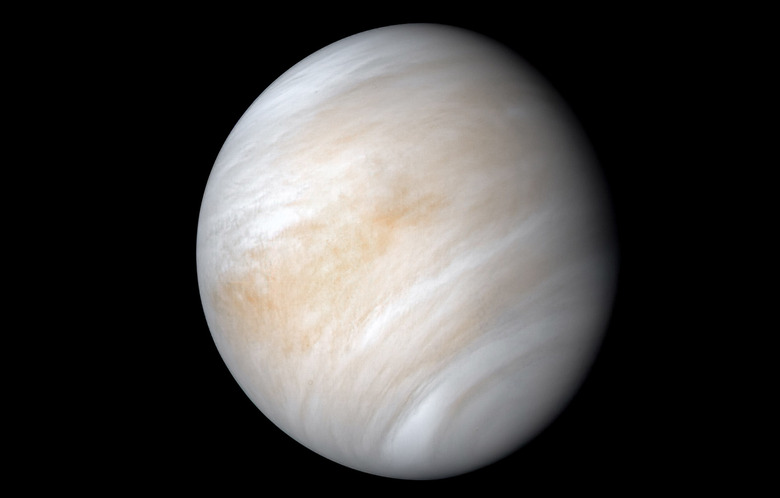How Long Are Days On Venus? We Finally Know The Answer
If you're a space news fan you've no doubt read many stories about exoplanet discoveries. Oftentimes, announcements of new exoplanets are coupled with information about the planet's surface temperature and how long its years are. With that in mind, the idea that we never knew how long days are on Venus — the planet nearest to Earth when pointing toward the Sun — may seem mind-boggling. Once you find out what scientists led by UCLA had to do to figure it out, it makes a lot more sense.
On Earth, we think of a year as a measurement of time alone, but it's really a byproduct of speed and distance. It's the measure of the time it takes for a planet to complete a revolution around its star. However, a year on Earth isn't exactly 365 days. We organized things that way because it's easier, but we use leap years to even everything out, or else the seasons would slowly start to slip. A day, on the other hand, is a measure of the rotation of the planet itself. For scientists studying Venus, this posed a big problem.
There are a number of factors working against scientists studying Venus. For one, the planet rotates very slowly. If it completed a rotation in a short enough time that an entire day could be observed while the planet was still in view, it might have been easier, but that's definitely not the case. Additionally, Venus is shrouded in clouds that make it impossible to see the surface from Earth. That means you can't just wait to see the same landmark come around again in order to measure a day.
So, in order to get an accurate measurement of how long a day on Venus is, the research team spent over a decade (of Earth years) blasting Venus with radar and recording data. What they found was that while there's an "average day" on Venus, the planet's days are incredibly unpredictable. The mass of the planet is not spread uniformly throughout the sphere, and the thick atmosphere is also likely causing the planet to spin faster or slower as it "sloshes" around the planet. The result is an unpredictable planet with days that last an average of 243 Earth days. Yep, a single day on Venus lasts approximately two-thirds of an Earth year.
What's even more incredible about this discovery is that we already knew how long a year on Venus is. Astronomers have calculated that a year on Venus is 225 Earth days, meaning that a year on Venus is actually shorter than a day on the planet. How's that for weird?
This research will help to more accurately plan future missions to Venus. Inaccurate estimates using old data could lead to serious issues when attempting to land at a precise location on Venus, but having a better understanding of how the planet rotates will mitigate these issues going forward.
